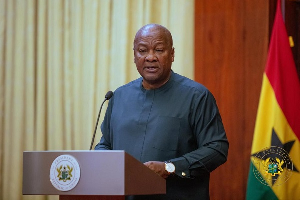Accra, March 5, GNA- A three-day second National HIV and AIDS Research Conference (NHARCON), which ended in Accra on Wednesday, recommended that Male Circumcision (MC) be promoted as an additional strategy for the prevention of heterosexually acquired HIV infection in men and should not replace known methods of HIV prevention. The conference said it was realized that MC has been found to be acceptable amongst community members, in that it was perceived to improve hygiene, reduce risk of Sexually Transmitted Infections and HIV.
Professor John Anarfi, Chairman of the NHARCON Planning Committee presenting the recommendations and the way forward of the conference said though MC was being practiced in Ghana there were some communities that were not practicing it.
"The biggest barriers to MC have been cost, and concerns about safety that is risk of infection or mutilation and pain". He advocated that Health Services be strengthened to increase access to safe male circumcision services as part of a comprehensive HIV prevention package
The conference, which was under the theme: "Sustaining a Comprehensive National Response to HIV and AIDS" and organized by the Ghana AIDS Commission (GAC) brought together over 600 participants both national and international researchers, policy makers and implementers who discussed national response to HIV and AIDS and initiated a process of developing research priorities.
The conference also recognised that there was ample evidence of psychiatric manifestations of HIV/AIDS, which is neurobiological disorders and syndromes, psycho-biological disorders and syndromes and psychosocial disorders and syndromes.
"Clinicians need be mindful of mental state of all HIV/AIDS patients on treatment for possible treatable mental condition". The conference called for the need to also look at the populations who are sidelined by society's expectations, and programmatic 'definitions' whilst GAC and Mental Health collaborate more closely to handle the overlaps.
It called for the need to also link HIV/AIDS treatment with substance abuse treatment and mental disorder whilst future research focuses on policy proposals to eliminate or reduce psychological problems facing orphans and children of HIV/AIDS parents. The conference highlighted the need to scale up prevention efforts such as condom use, which must be accessible for youth and other marginalized groups.
"Emphasis must also be on abstinence for the adolescent, prevention messages should be accessible for all groups including, the aged, youth and persons living with disabilities and further efforts should be made to galvanise community support for condom use by adolescents". The conference also identified new areas for further research, such as the Alfafa plant and the viability to enhance the use of traditional medicine.
Correct use of condoms in the event of sexual activity was another area that needed further research whilst dietary intake as a potential determinant of the clinical outcomes among this category of pregnant women should also be studied.
The conference recommended that lactation support should be provided to HIV positive mothers who wished to breast feed their babies to enable exclusive breast feeding. It said lack of access to treatment and care was identified as the most serious challenge facing the country in its response to the HIV/AIDS menace and called for the need to develop innovative financing methods of achieving Universal Free Coverage of Anti Retroviral Therapy and put in place an integrated system of health financing methods comprising to comprise of tax-funded health promotion, Social Health Insurance and HIV/AIDS care provision or subsidy.
The conference also identified reversing the spread of HIV/AIDs among Ghanaian youth population as a necessary intervention in meeting the MDG goal six, which aimed at combating HIV/AIDS. In order to reach the youth and make an impact, the conference called for the need to develop comprehensive interventions to increase their knowledge, consider Sexually Reproductive Health, HIV/AIDS programmes for young people with life planning skills and alternative income generating activities and information for young people packaged in a way that would attract young people's attention. Dr Eilas Sory, Director-General of the Ghana Health Service who closed the conference expressed the worry that HIV/AIDS continued to be a cause of death and was among the first 10 causes of death in the country.
He noted that though the HIV prevalence had dropped from 2.22 per cent in 2006 to 1.9 per cent in 2007, Ghanaians should not be complacent but intensify efforts to ensure further prevalence reduction. Mr. Samuel Kusi of the Curious Minds, a youth advocacy group, called for youth participation, increase in their involvement in policy research and programmes for the youth. Professor Fred Sai, Presidential Advisor on HIV and AIDS, Reproductive Health and Population Issues, who chaired commended participants for the contributions urged them to implement the recommendations agreed on in their various regions and districts. He also commended development partners for their financial and technical support in the fight against HIV and AIDS in the country. 05 March 08
Health News of Wednesday, 5 March 2008
Source: GNA
















